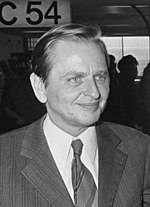Olof Palme, Date of Birth, Place of Birth, Date of Death
TweetOlof Palme
Swedish politician, Prime Minister from 1969-76 and 1982-86About Olof Palme
- Sven Olof Joachim Palme (; Swedish: [?u?l?f ?pal?m?] (listen); 30 January 1927 – 28 February 1986) was a Swedish politician and statesman.
- A longtime protégé of Prime Minister Tage Erlander, Palme led the Swedish Social Democratic Party from 1969 until his assassination in 1986, and was twice Prime Minister of Sweden, heading a Privy Council Government from 1969 to 1976 and a cabinet government from 1982 until his death.
- Electoral defeats in 1976 and 1979 marked the end of Social Democratic hegemony in Swedish politics, which had seen 40 years of unbroken rule by the party.
- While leader of the opposition, he parted domestic and international interests and served as special mediator of the United Nations in the Iran–Iraq War, and was President of the Nordic Council in 1979.
- He returned as Prime Minister after electoral victories in 1982 and 1985. Palme was a pivotal and polarizing figure domestically as well as in international politics from the 1960s.
- He was steadfast in his non-alignment policy towards the superpowers, accompanied by support for numerous third world liberation movements following decolonization including, most controversially, economic and vocal support for a number of Third World governments.
- He was the first Western head of government to visit Cuba after its revolution, giving a speech in Santiago praising contemporary Cuban and Cambodian revolutionaries. Frequently a critic of United States and Soviet foreign policy, he resorted to fierce and often polarizing criticism in pinpointing his resistance towards imperialist ambitions and authoritarian regimes, including those of Francisco Franco of Spain, Leonid Brezhnev of the Soviet Union, António de Oliveira Salazar of Portugal and Gustáv Husák of Czechoslovakia, as well as John Vorster and P.
- W.
- Botha of South Africa.
- His 1972 condemnation of the Hanoi bombings, notably comparing the tactic to the Treblinka extermination camp, resulted in a temporary freeze in Sweden–United States relations. Palme's murder on a Stockholm street on 28 February 1986 was the first assassination of a national leader in Sweden since Gustav III in 1792, and had a great impact across Scandinavia.
- Local convict and addict Christer Pettersson was originally convicted of the murder in district court but was acquitted on appeal to the Svea Court of Appeal.
Read more at Wikipedia


 Date of Birth:
Date of Birth:  Place of Birth: Stockholm, Sweden
Place of Birth: Stockholm, Sweden